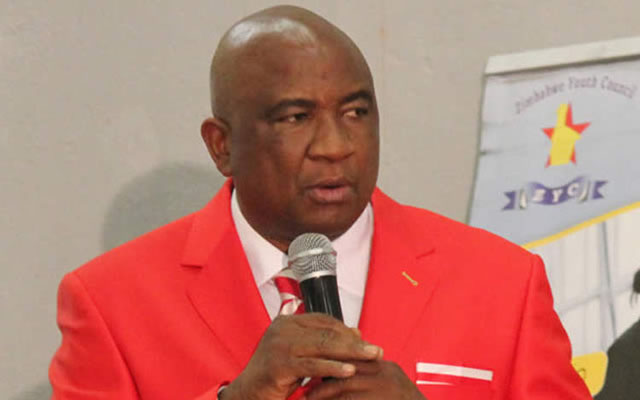ZIFA POLL BOMBSHELL

Robson Sharuko Senior Sports Editor
THE ZIFA presidency is a four-year cycle cast in stone and there are no provisions in the association’s constitution for an incumbent’s term of office to be completed through a relay, in a stunning development which makes a mockery of the election madness which has gripped domestic football in recent weeks.
The election fever has sucked in the Sports Commission, whose acting director-general Joseph Muchechetere, issued a statement at the weekend threatening intervention should elections for the ZIFA leadership, including the presidency, are not held by the end of next month.
A number of hawks have been circling over ZIFA as they jostle for a piece of the pie in the expected feast, amid expectations Philip Chiyangwa’s term of office should end at the close of next month, because he is merely completing Cuthbert Dube’s term.
But, according to the ZIFA constitution, Chiyangwa is entitled to a full four-year term from the date he assumed office in December 2015 after Dube had his four-year mandate revoked by the ZIFA councillors in 2015, a day after he tendered his resignation. Chiyangwa beat Trevor Carelse-Juul, Leslie Gwindi and James Takavada on December 5 that same year for the leadership of domestic football.
The councillors also revoked the mandate of all the ZIFA executive members that day and elected a new group of leaders with Omega Sibanda, who had been suspended by the Dube leadership, beating Lincoln Mutasa to come in as the vice president and Philemon Machana being handed the portfolio of taking care of the finances.
There has been a frenzy in mainstream media and social media reports that fresh elections at ZIFA should be held by the end of next month and failure to do that, will plunge the game into a crisis of monumental proportions as Chiyangwa’s term of office would have expired.
However, investigations by The Herald have authoritatively established that the ZIFA presidential term of office cannot be passed through a baton, like in a relay and once elected, the association’s president is handed a four-year mandate which can only be cut short through revocation of such authority by the councillors.
This is unlike the case at FIFA where the president of the world football governing body, whose mandate would have been revoked during the term of his office for one reason or another, is replaced by someone who then completes that term and seeks a fresh mandate at the end of that cycle.
According to the current ZIFA constitution, as amended and ratified on September 2013, the ZIFA president, once elected into that position, has to serve a full four-year term unless that cycle is cut short by revocation of the mandate by the Councillors.
This means Chiyangwa’s term of office is a full four-year term and expires in December next year and not at the end of next month.
Article 25 of the ZIFA Constitution, which deals with elections, clearly reads:
25 (ii) Elections for ZIFA members shall be conducted in accordance with the ZIFA Constitution and ZIFA Electoral Code.
25 (iv) For a person to be elected, a simple majority (more than 50 percent) of the valid votes cast, is necessary in the first ballot.
25 (v) If there are more than two candidates for one available position, only the two candidates that obtain the highest number of valid votes shall proceed to a second ballot. For a person to be elected, a simple majority (more than 50 percent) of the valid votes cast is necessary in the second ballot.
25 (vi) FOR THE ELECTIONS OF THE PRESIDENT OF ZIFA, THE RESPECTIVE PROVISIONS IN ARTICLE 38 OF THESE STATUTES SHALL APPLY.
Article 38 of the same Constitution, which then deals with the candidates for the office of the ZIFA president, stipulate that:
38 (i) The president shall be elected for a PERIOD OF FOUR YEARS. HIS MANDATE SHALL BEGIN AFTER THE END OF THE CONGRESS WHICH HAS ELECTED HIM. A PRESIDENT MAY BE RE-ELECTED ONCE.
38 (v) If the president is permanently prevented from performing his official function and his position becomes vacant (e.g. death, resignation, unexcused absence from the Executive Committee for three consecutive meetings) the Vice-President shall represent him until the
next Congress. This Congress shall elect a new president, if necessary. Article 32, which deals with the composition of the ZIFA executive committee, stipulates:
32 (iii) The mandate of the president, vice president and members of the executive committee is for FOUR years. They may be elected for one additional term.
32 (ix) If a position, OTHER THAN THE PRESIDENT, should become vacant (e.g. death, resignation, unexcused absence from the executive committee for three consecutive meetings), the executive committee shall fill that position until the next Congress, when a replacement will be elected for the remaining term of mandate.
32 (x) if more than 50 percent of the positions become vacant, the general-secretary shall convene an extraordinary congress within two months in order to elect a replacement for the remaining term of mandate under the supervision of the Electoral Committee according to the ZIFA Electoral Code.
What is very clear, from the current ZIFA constitution, which was crafted by the old leadership, is that the position of ZIFA president is not treated the same as those of the executive committee members.
It’s the only position whose occupancy, in the event it becomes vacant, for one reason or another, is not filled to “elect a replacement for the remaining term of mandate,’’ of the previous holder of that position and is the only one with an age limit as the holder must not be younger than 40 years.
That’s why in Article 32 (ix) of the constitution, the wording is very clear that, “if a position (on the executive committee), OTHER THAN THE PRESIDENT, should become vacant, the executive committee shall fill that position until the next Congress, when a replacement will be elected for the REMAINING TERM OF MANDATE.’’
How, then, was this crafted?
“This was meant to ensure that anyone who becomes ZIFA president doesn’t get disadvantaged, in the event he or she assumes that position in the middle of someone’s term, because he or she can’t seek more than two terms in charge,’’ a Harare lawyer said.
“For example, if Dube’s resignation and revocation of mandate had come three months ago, the person who would replace him would be at a disadvantage, in terms of only being able to seek that mandate twice, in that his first term would have been for just a few months and then, in the event he or she wins re-election, he or she would then complete the four years. That person would be deemed to have served two terms, and ineligible to seek a mandate for a third term, when in fact he or she served just four years and a few months.
“Such an arrangement would be in violation of the ZIFA constitution which is very clear that a president’s mandate is for four years and separates that position from the others on the executive committee.
“That is why the fees which one has to pay to be president are not reduced, even if he or she is taking over during a cycle which should have been completed by someone else, and that is why the constitution differentiates between elections for ZIFA members (the executive committee) and the ZIFA president.’’
Article 38 (i), which says “the president shall be elected for a PERIOD OF FOUR YEARS. HIS MANDATE SHALL BEGIN AFTER THE END OF THE CONGRESS WHICH HAS ELECTED HIM”, then provides explanation for the start and end of Chiyangwa’s term of office.
But can a ZIFA president then serve without his or her lieutenants, the executive committee or the Congress, in the event their terms of office would have expired and elections had not been held by then?
Article 2 (c) of the ZIFA Electoral Code provides that answer as it says, “unless this code states otherwise, the elected bodies of ZIFA (area zones, provinces, regions and the Premiership) shall continue to exercise their functions until the completion of the electoral process.”








Comments